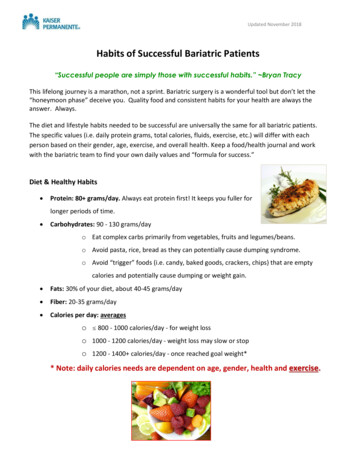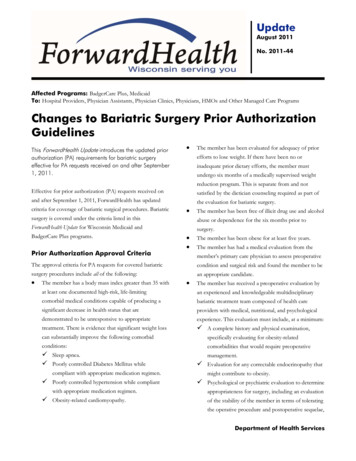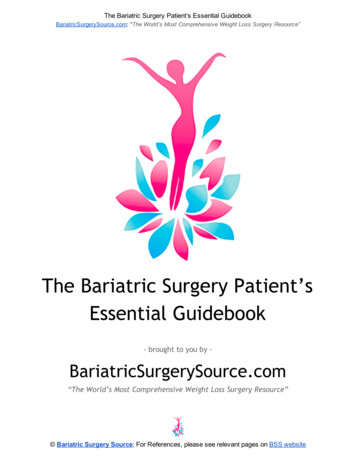
Transcription
Updated November 2018Habits of Successful Bariatric Patients“Successful people are simply those with successful habits.” Bryan TracyThis lifelong journey is a marathon, not a sprint. Bariatric surgery is a wonderful tool but don’t let the“honeymoon phase” deceive you. Quality food and consistent habits for your health are always theanswer. Always.The diet and lifestyle habits needed to be successful are universally the same for all bariatric patients.The specific values (i.e. daily protein grams, total calories, fluids, exercise, etc.) will differ with eachperson based on their gender, age, exercise, and overall health. Keep a food/health journal and workwith the bariatric team to find your own daily values and “formula for success.”Diet & Healthy Habits Protein: 80 grams/day. Always eat protein first! It keeps you fuller forlonger periods of time. Carbohydrates: 90 - 130 grams/dayo Eat complex carbs primarily from vegetables, fruits and legumes/beans.o Avoid pasta, rice, bread as they can potentially cause dumping syndrome.o Avoid “trigger” foods (i.e. candy, baked goods, crackers, chips) that are emptycalories and potentially cause dumping or weight gain. Fats: 30% of your diet, about 40-45 grams/day Fiber: 20-35 grams/day Calories per day: averageso 800 - 1000 calories/day - for weight losso 1000 - 1200 calories/day - weight loss may slow or stopo 1200 - 1400 calories/day - once reached goal weight** Note: daily calories needs are dependent on age, gender, health and exercise.
Updated November 2018 Number of meals: average 5 mini meals dailyo Eat every 3-4 hours; at regular meal times.o Planning and preparing your meals is essential to ensure you meet your nutritional needsand avoid problem/trigger foods. Length of meals & snacks: 20 - 30 minuteso Eat slowly and mindfully; away from distraction (i.e. computer, TV, iPad, driving).o Take small, dime sized bites, and chew thoroughly.o Listen to your body to determine your last bite “threshold.” Total fluids: 64 oz. daily. Water is preferred.o Take small sips, avoid gulping.o No carbonated or sweetened drinks & no straws: this is a lifetime habit.o Limit caffeine to 16 ounces a day. Decaf is preferred. Avoid highfat/sugar creamers.o Avoid or limit alcohol.o Separate Fluids from Meals: always separate your fluids from your mini meals and wait aminimum of 30 minutes (60 minutes is preferable) after eating before resuming fluids. Food Records/Health Journal: keep daily.o Keeping records increase your awareness, keep you accountable, and help you stay ontrack with your protein/diet, fluids, vitamins and exercise.o Utilize your food records to discover the proteins/foods that that work best in your bodyand those that cause distress.o Success leaves clues. Tracking your triumphs & challenges supports your long-term weight& health management.
Updated November 2018 Vitamins and Supplements: take daily & for the rest of your life to avoid deficiencies. *Gastric Bypass & Sleeve GastrectomyVitamins & SupplementsServings per Day*Bariatric formulated multivitamin-mineral with18 - 60 mg iron and 500 mcg Vitamin B121 servingVitamin B-complex (with 50 mg of thiamin)Calcium Citrate with Vitamin D3(total 1200 - 1500 mg daily)1 serving600 mg per serving 2 servings500 mg per serving 3 servingsProbiotic1 serving*Servings sizes vary with different brands, READ THE LABELFor information on recommended brands, refer to the Bariatric Vitamins RecommendedBrands & Daily Requirements handout. Exercise: 30 - 45 minutes a day, 5 - 7 days a week and work up to a total of 300 minutes ofexercise per week.o Strength training at least 90 minutes per week. This helps to preserve and build musclemass. The more muscle you have, the more calories you burn.o Stretching keeps you limber and can help prevent injuries.Stretching and balance training helps improve performance ofeveryday activities and assists with posture, minimizing stressand maximizes the strength of all joint movements. Sleep: aim for 7 - 8 hours a night (number of hours needed varies withindividuals).o Consistent, quality sleep plays an essential role in weight management, good health, andwell-being throughout your life.o Sleep affects almost everything in your body: immune system, stress hormones, appetite,blood pressure, pain levels, and cardiovascular health to name a few.o Avoid alcohol, caffeine, or nicotine. They disrupt sleep.o Exercise early in the day to help you fall asleep faster and sleep more soundly.o If you have sleep apnea, use your C-pap machine.o Power down. Light from the TV, cell phone, tablets can prevent you from falling asleep.oKeep your bedroom, dark, cool and quiet for a better slumber.
Updated November 2018 Support: having a team of people to call on will provide encouragement, give you strength, keepyou accountable, and offers inspiration. Support can be from friends, family, coworkers,neighbors and support groups (both online or in person).Types of support:o Emotional: a shoulder to lean on when you're feeling disheartened.o Practical: someone to help you plan or prep meals, or watch the kids whileyou exercise.o Motivating: a walking buddy or exercise partner who encourages you toget out and move on those days when you’d rather be a lump on the couch. Bariatric Medical Team: lifelong supporto Call the bariatric team any time with a question or concern. If you are concerned, it’sreason enough to call. (425) 502-3454.o The bariatric team follows you for the rest of your life. Think of us as a surgical primarycare team; here to help you with your special needs as a bariatric patient.o Come in for your annual visits; the bariatric providers will review your progress andhabits; including your labs, diet, vitamins, and exercise.o Labs: if your lab values indicate a deficiency, it is critical to catch it early and adjust yourdiet &/or vitamin intake accordingly.o Stay on track. The ongoing path of staying healthy is riddled with challenges andsetbacks; it’s a normal part of life. Call us when you need some extra support, we are hereto help you and keep you on track.o Share good news too! We love to hear about successes, victories and achievements – nomatter how great or small. Share with us how the surgery and your improved health hasmade a difference in your life. Email us at bariatricpatients@kp.org.
Updated November 2018Bariatric Support Group Locations All locations are open to Kaiser Permanente bariatric patients (pre- and post-op)No registration necessaryWe continue to work on solutions to provide support groups inother clinics. Thank you for your patience.BELLEVUE Kaiser Permanente Bellevue Bariatric Support Groupo Held quarterly, the 3rd Wednesday of the montho January, April, July & October, 6:00 - 8:00 pm Bellevue Medical Center, Room E101/105Please call 425-502-3454 for more information. Overlake Bariatric Support Group in Bellevueo Held twice monthly: 2nd Thursday; 6:00 – 8:00 pm and 4th Saturday; 10:00 – 12:00 pm Overlake Medical Center - PACCAR Education CenterInsight Conference Room1035 116th Ave. NE, Bellevue, WA 98004Please call 425-467-3957 for more information.TACOMA MultiCare Center for Weight Loss and Wellness in Tacomao Held on the 4th Monday of every month, 5:30 – 6:30 pm 2202 S Cedar St. Suite 300 Tacoma WA 98405Please call 253-301-5280 for more information.SUMNER YMCA in Sumnero Held on the 2nd Wednesday of every month, 5:30 – 6:30 pm 16101 64th St E Sumner WA 98390Please call 253-301-5280 for more information.REMEMBER: There is no cure for obesity, but there is a lifelong path tomanaging it. Maintain these healthy habits for a lifetime, not just the first 1 - 2 years aftersurgery, to be successful.These guidelines will help you succeed in long term weight and healthmanagement and prevent nutrient deficiencies.
BELLEVUE Kaiser Permanente Bellevue Bariatric Support Group . o Held quarterly, the 3. rd. Wednesday of the month o January, April, July & October, 6:00 - 8:00 pm Bellevue Medical Center, Room E101/105 Please call 425-502-3454 for more information. Overlake Bariatric Support Group in Bellevue. o Held twice monthly: 2. nd











